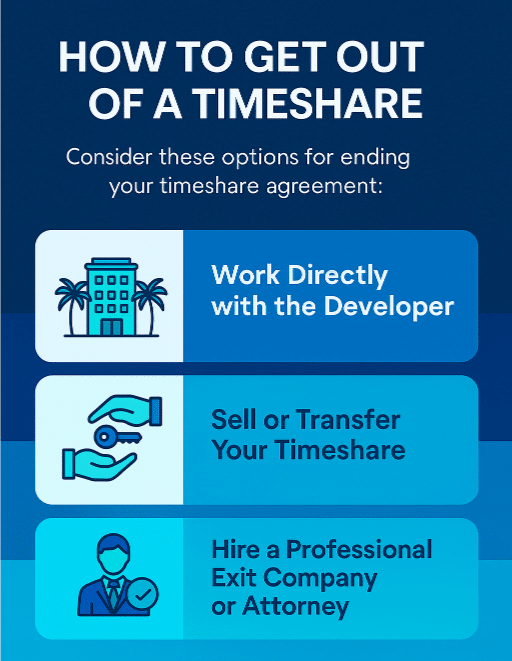Missed the Rescission Window? Here’s How to Cancel Your Timeshare Before It Drains Your Wallet
Have you found yourself trapped in a timeshare contract that no longer serves your needs or budget? You’re not alone. Millions of people face the daunting challenge of cancelling timeshare contracts. It’s a situation that can leave you feeling helpless and frustrated, especially when you realize the “dream vacation” you were sold isn’t quite living up to expectations.
But here’s the good news: there’s hope.
How to Cancel a Timeshare After the Rescission Period Has Ended:
While canceling a timeshare after the rescission period is more challenging, it’s not impossible. Whether you’ve just signed the contract or you’ve been a timeshare owner for years, there are strategies and options available to help you break free from your timeshare obligations.
In this comprehensive guide, we’ll walk you through the process of canceling your timeshare, even if you’ve missed the initial rescission window. We’ll explore your rights as a consumer, the legal avenues you can pursue, and practical steps to protect yourself in timeshare deals. From understanding state laws to navigating the cancellation process, we’ve got you covered. Let’s dive in and discover how you can reclaim your financial freedom from unwanted timeshare commitments.
Rescission Period Is Over—Now What? Your Guide to Timeshare Cancellation
Canceling a timeshare after the rescission period can be challenging, but it’s not impossible. The most straightforward way to cancel your timeshare after the rescission period is to contact the timeshare company directly and request a cancellation. While this may seem simple, it’s important to understand that timeshare companies are often reluctant to cancel contracts outside of the rescission period, as they stand to lose money.
How to Approach the Timeshare Company for Cancellation
When you reach out to the timeshare company, be prepared to explain your situation clearly and concisely. You may need to provide a compelling reason for why you want to cancel, such as financial hardship, health issues, or a significant change in life circumstances. It’s crucial to remain polite but firm in your request, as this approach is more likely to yield positive results.
Exploring Alternative Options: Selling or Transferring Your Timeshare
If the timeshare company is unwilling to cancel your contract, you may need to explore other options. One possibility is to sell your timeshare on the secondary market. However, be aware that timeshares often hold little to no resale value, this is usually not a viable option for most timeshare owners. If you know someone willing to take over the future obligation, you can transfer the timeshare ownership on to them. Make sure they have the intent and ability to pay the cost of ownership and have your resort involved in the transfer. If you have a loan balance with the timeshare company, be prepared to pay this in full before selling a timeshare or transferring a timeshare.
When to Seek Legal Advice for Timeshare Cancellation
For those facing more complex situations or dealing with uncooperative timeshare companies, seeking legal advice may be necessary. An attorney specializing in timeshare law can review your contract and advise you on the best course of action. They may be able to identify potential violations of consumer protection laws or other legal grounds for cancellation.
Hire an Experienced Timeshare Exit Company
Another option is to contact a timeshare exit company that can assist with canceling your contract. However, it’s crucial to thoroughly research any company before engaging their services, as there are unfortunately many scams in this industry. Look for companies with a proven track record and positive customer reviews.
Stopping Payments on Your Timeshare
Lastly, if all other options have been exhausted, you might consider simply stopping payments on your timeshare. This is a risky strategy that should only be considered as a last resort, as it can negatively impact your credit score and potentially lead to legal action against you.
🔑 Key Takeaways: Cancelling Timeshare After Rescission
Start by Contacting the Timeshare Company
Politely request cancellation and be clear about your circumstances.
Timeshare companies are unlikely to cancel contracts easily, but it’s still the first step.
Be Prepared with a Strong Reason
Common reasons include financial hardship, health issues, or major life changes.
Stay respectful but assertive in your request.
Explore Selling or Transferring the Timeshare
Resale value is often extremely low—many listings go for $1.
If transferring to someone you know, involve the resort and ensure they understand the costs.
Consider Seeking Legal Advice
An attorney who specializes in timeshare law can review your contract.
They may identify legal grounds for cancellation, such as consumer protection violations.
Hire a Reputable Timeshare Exit Company
Research thoroughly to avoid scams.
Look for firms with verified reviews and a track record of successful exits.
Stopping Payments
This can damage your credit and lead to legal consequences.
You may want to consider this only if you have professional assistance.
Just Bought a Timeshare? Here's the One Thing You Must Do Before It’s Too Late!
If you’ve just bought a timeshare and are experiencing buyer’s remorse, you might be wondering if there’s a way out. The good news is that you may have options, but the bad news is that time is of the essence. Let’s explore the possibilities and what you need to do to cancel your timeshare purchase.
Understanding the Rescission Period
The most crucial factor in canceling a recently purchased timeshare is the rescission period. According to experienced timeshare exit attorneys, this is a legally mandated cooling-off period during which you can cancel your timeshare contract without penalty. Here’s what you need to know:
- Rescission periods vary by state, typically ranging from 3 to 15 days
- The clock starts ticking from the day you sign the contract or receive the public offering statement, whichever is later
- Weekends and holidays usually count towards the rescission period
Acting Quickly: Steps to Cancel Within the Rescission Period
If you’re within the rescission period, follow these steps to cancel your timeshare:
- Review your contract for cancellation instructions
- Draft a cancellation letter (keep it simple and direct)
- Send the letter via certified mail with return receipt requested
- Keep copies of all correspondence and receipts
Rescission Period by State: A Quick Reference
Here’s a table showing rescission periods for some states:
Note: This table is not exhaustive. Always check your specific state’s laws or consult with a legal professional.
What If You've Missed the Rescission Period?
If you’ve missed the rescission period, canceling becomes more challenging but not impossible. After an owner realizes they have missed the rescission window, they open their web browser or AI app and begin searching for what their options are to get cancel the timeshare contract. In order to spare you from getting lost in the blackhole of infinite sources vying for your search traffic, we have outlined some options to consider.
How to Get Out of a Timeshare:
You can get out of a timeshare by working directly with the resort for a deed-back, selling or transferring it to someone else, or hiring a trusted exit company or attorney to handle the process legally and professionally.
1. Work Directly with the Developer
Many timeshare developers have internal options for owners seeking to cancel. This may include deed-back programs, deed-in-lieu of foreclosure, or even settlement agreements for release. While these aren’t always advertised, reaching out to your resort’s owner services department could uncover a viable solution. Be prepared to pay an administrative fee or settle any outstanding dues as part of the process.
2. Sell or Transfer Your Timeshare
Though it’s possible to sell or transfer your timeshare, the secondary market is heavily saturated. Most listings are priced at $1—and even then, they can sit unsold for years. If you’re considering this route, be honest about the fees and obligations involved, and watch out for resale scams that charge upfront fees without delivering results.
3. Hire a Professional Exit Company or Attorney
If you’ve hit a dead end with the developer, consider enlisting help from a reputable timeshare exit company—ideally one offering attorney-based services. Legal professionals can help identify contract violations, negotiate terms, and guide you through a legitimate cancellation process. Be sure to vet the company’s reputation through the BBB, online reviews, and verified business records.

The Importance of Documentation
Whether you’re canceling within the rescission period or exploring other options, documentation is crucial. Keep detailed records of:
- Your original contract
- All correspondence with the timeshare company
- Receipts for mailing cancellation letters
- Notes from phone conversations (including dates and names)
This documentation can be invaluable if you need to prove your cancellation attempts or if legal issues arise.
Overwhelmed by Your Timeshare? Get Expert Help to Navigate the Exit Process
Exiting a timeshare after the rescission period can be a complex and frustrating process. From dealing with uncooperative companies to navigating onerous agreements, many owners find themselves overwhelmed and unsure of where to turn. While there are several potential paths to cancellation, each comes with its own set of challenges and considerations.
If you’re feeling stuck or uncertain about your next steps, know that you don’t have to face this alone. Vacation Ownership Consultants specialize in helping timeshare owners like you find tried-and-true solutions. Complete the eligibility form below today for a free, no-obligation consultation and take the first step toward ending your future timeshare contract obligation.






